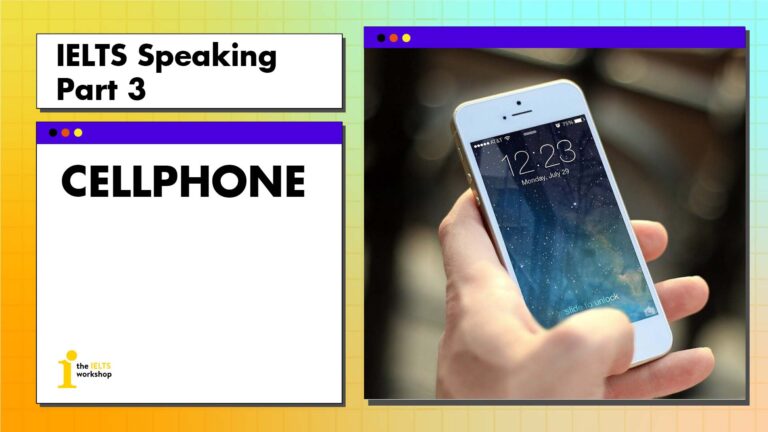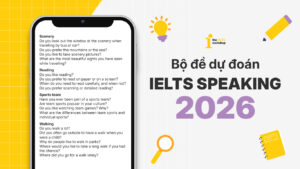Nói về Chủ đề IELTS Speaking Part 3 Cellphone trong bài thi IELTS Speaking, một số câu hỏi Part 3 mà thí sinh có thể gặp phải như:
1. What do you usually do with a cellphone?
2. What are the differences between young people and old people when using a cellphone?
3. Which one is more important, using a cellphone to make phone calls or to read messages?
4. Do you think there should be a law to stop people from making phone calls in public?
Dưới đây là hai cách trả lời mẫu cho chủ đề CELLPHONE đến từ thầy Tiến Ngọc với Sample 1 (Giáo viên tại The IELTS Workshop HCM) và thầy Hoàng Hưng với Sample 2 (Giáo viên tại The IELTS Workshop HN). Bạn đọc có thể tham khảo bài mẫu phù hợp với bản thân mình nhé.
1. What do you usually do with a cellphone?
Sample 1: Smartphones play an inevitable part in my daily life because they help me in various aspects. On a daily basis, I use social media apps on my smartphone. You know, Facebook, Instagram and the like. It’s very convenient because I can carry it around but can still know what my friends are up to these days. Besides, smartphones are very beneficial to my work. Compared to a large and heavy laptop, working through a smartphone seems more effortless to me thanks to its equal convenience but greater portability.
- Play an inevitable/ indispensable part: đóng một vai trò không thể thiếu
- On a daily basis: Mỗi ngày
- And the like: và những thứ tương tự
- Be up to sth: đang làm gì
- Portability (n) sự dễ mang đi
Sample 2: All sorts of things, really. It is vital not only for my job but in my personal life as well. I use it to keep in touch with my friends and relatives, you know, calling, texting, making video calls and that kind of thing. I don’t think I could function without my mobile phone
2. What are the differences between young people and old people when using a cellphone?
Sample 1: Contrary to a common belief that the old are usually technophobes and do not have the faintest idea of how to use apps, the elderly nowadays are familiar with technology. Besides calling, the old use cellphones to read online newspapers and use social media to keep themselves updated on the latest news of their friends and grandchildren, while I think that photo-editing tools are more popular among the young. Most of the young generation attach a lot of importance to look as pretty as possible on social media so they spend time taking and editing photos to perfect their image.
- Technophobe (n) người không thích công nghệ
- Not have the faintest idea of sth (v) hoàn toàn mù tịt về điều gì
- Keep one’s updated on the latest news (v) được cập nhật tin tức mới nhất
Sample 2: As far as I’m concerned, the elderly mainly use their phones for communication purposes such as texting or calling, as opposed to the young who use their devices for a much wider range of activities like snapping photos, entertaining or studying. That’s why they tend to spend a greater amount of time on their gadgets than elderly people.
3. Which one is more important, using a cellphone to make phone calls or to read messages?
Sample 1: I think they are of equal importance. Making phone calls is a very basic function in urgent situations. When the caller needs to reach someone immediately, calls would be a more favorable choice. On the other hand, exchanging messages is also an indispensable part of a cellphone in inconvenient cases. For instance, when the receiver is unavailable or incapable of picking up the phone, leaving a message to require him to call back is much more suitable than keeping ringing him continuously. So I think whether ringing or texting is more crucial depends on different circumstances.
Sample 2: I suppose it depends on the situation. If it’s something more urgent such as things that need to be solved right away or when someone’s in big trouble, then making phone calls are preferable. On the other hand, if it’s just a casual conversation about trivial matters, sending texts is less intrusive than a phone call because it gives the receiver the freedom to reply whenever they want.
4. Do you think there should be a law to stop people from making phone calls in public?
Sample 1: Personally, I cannot say I agree with this. Sometimes, loud phone calls are admittedly annoying and offensive in public places requiring quietness. However, it would be unnecessarily strict to enact a policy on banning people from making calls in all public places as a whole. This would be unfair for those under an emergency and forced to make or receive an urgent call. Instead, I think it would be a more appropriate approach to discourage people from making loud calls in certain spaces such as lifts or libraries by making a rule or giving a fine.
- To enact a policy on sth: ban hành chính sách về điều gì
Sample 2: I’m in disagreement with that idea, to be honest. Although sounds and the light from phones can, admittedly, distract people at a library or at a shop, the convenience they bring to people should take precedence. For example, shoppers can do the check out online through their phones without having to wait in a long queue during peak shopping hours, which is more convenient and time-saving.
Bài mẫu bởi thầy Tiến Ngọc & thầy Hoàng Hưng – Giáo viên tại The IELTS Workshop
Tạm kết
Trên đây là bài mẫu IELTS Speaking Part 3 Cellphone mà bạn có thể tham khảo. Để có thể nâng cao khả năng làm Speaking, bạn có thể tham khảo khóa Senior của The IELTS Workshop để nâng band dễ dàng hơn nhé.








